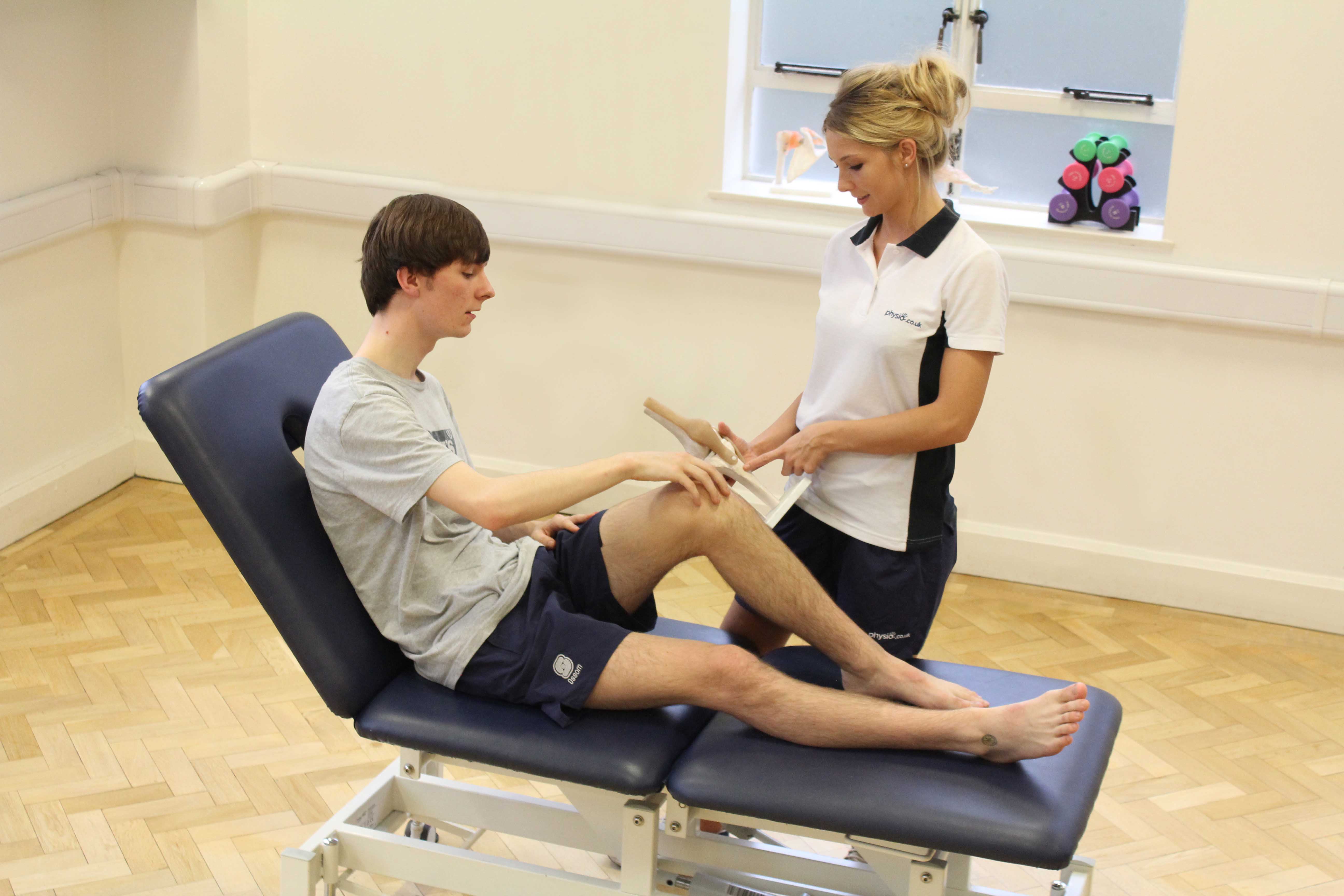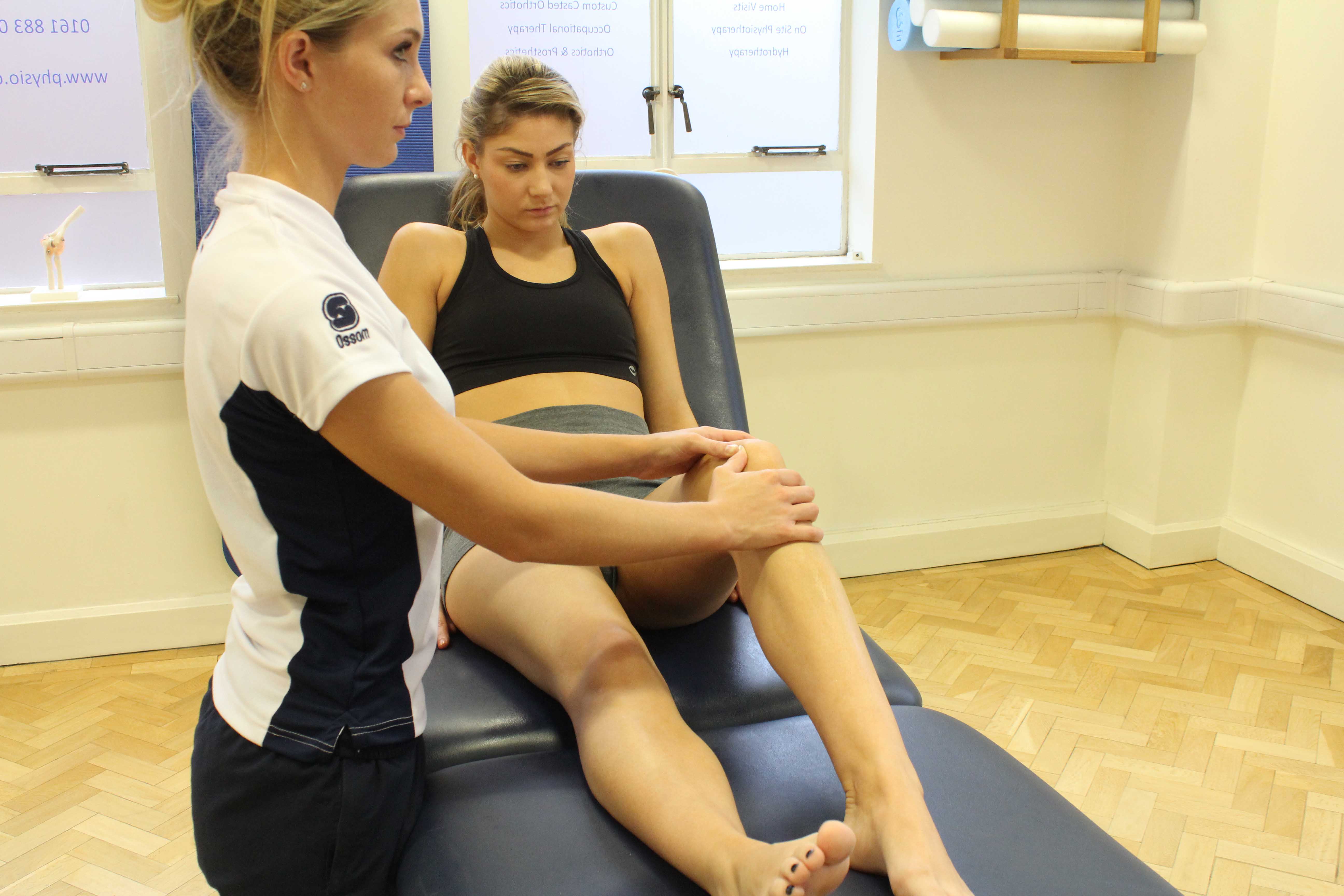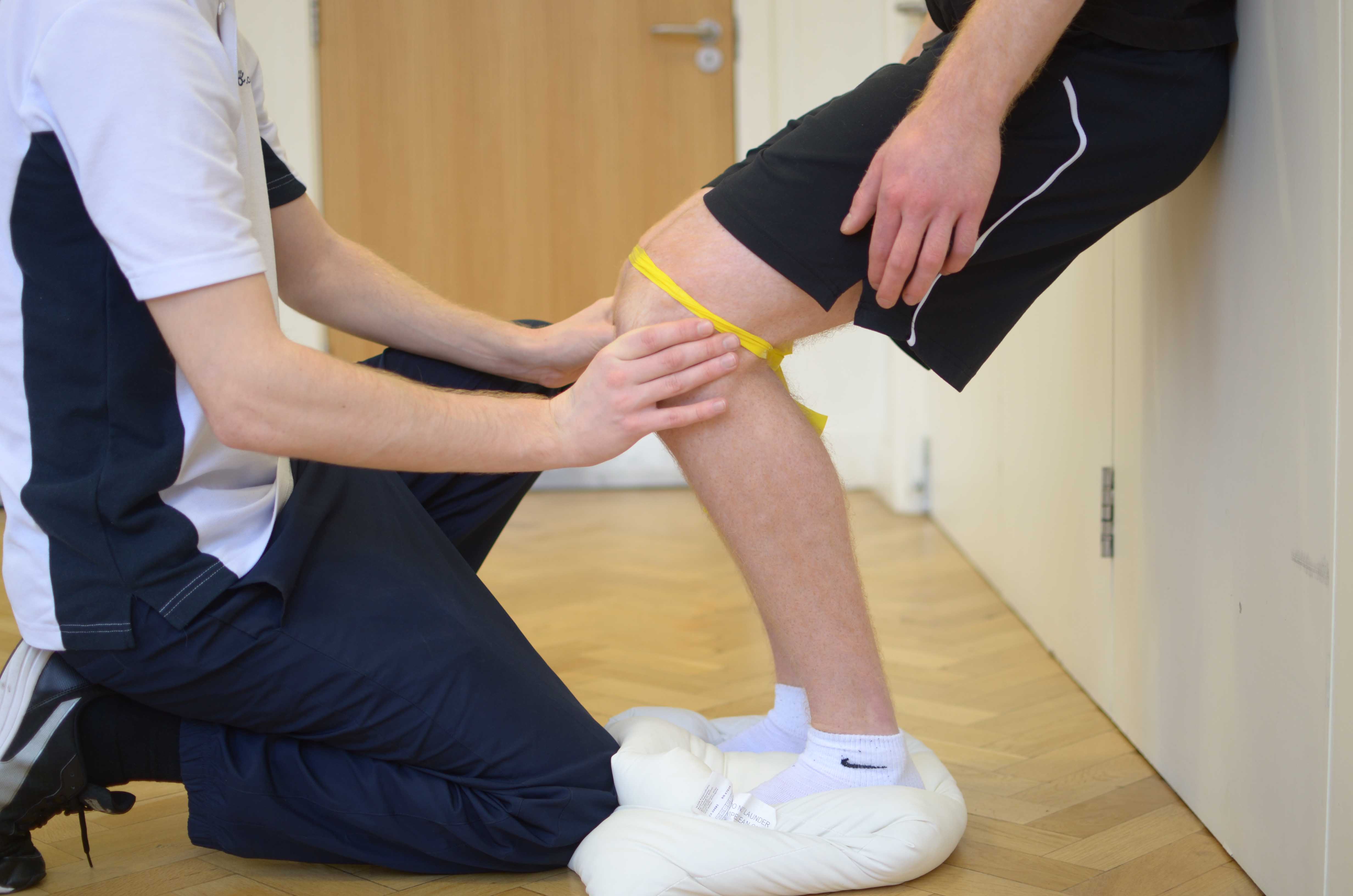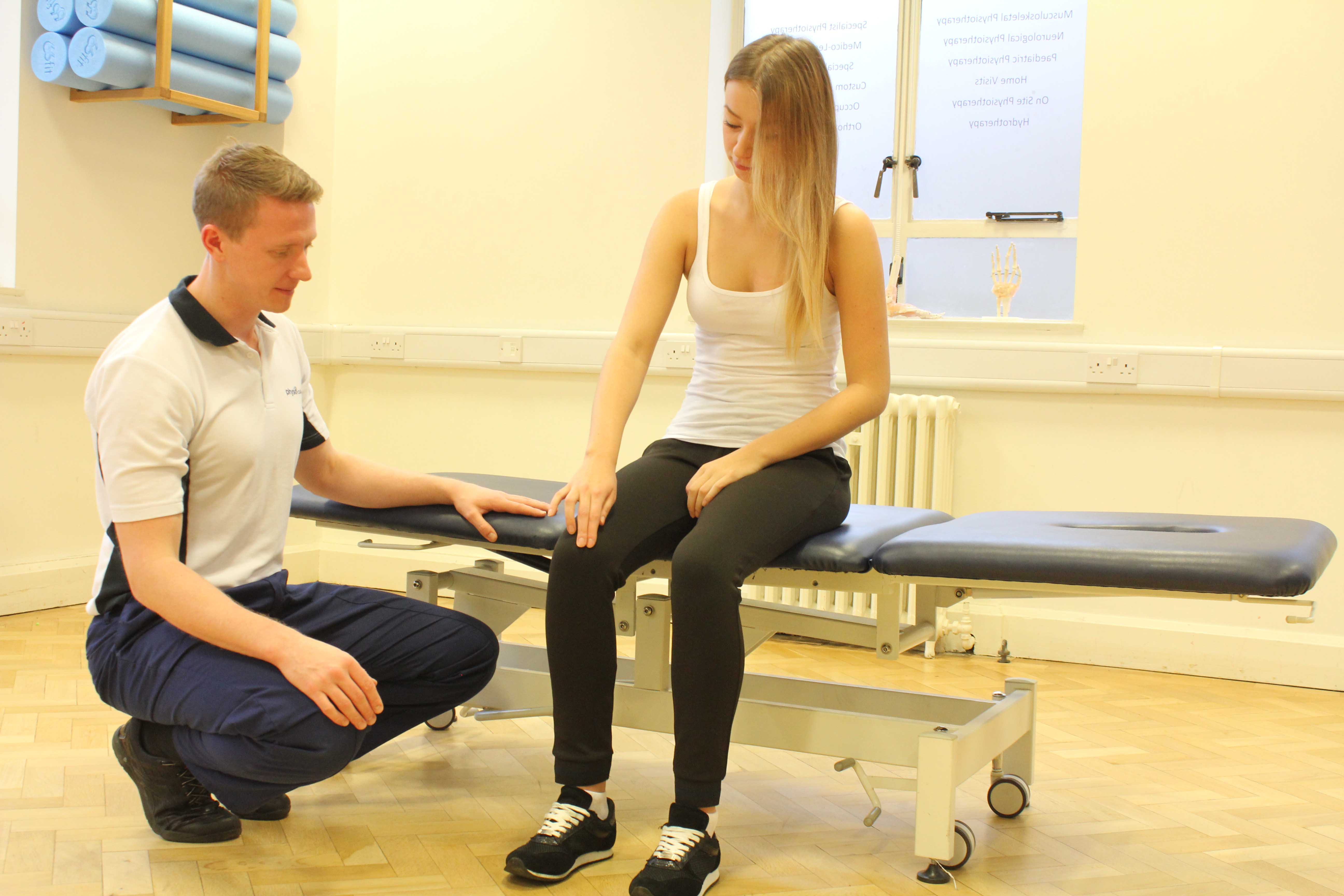The menisci are two pads of cartilage like tissues within the knee that help the joint to function properly. This is done by bearing load, absorbing shock and stabilising the joint.
Following an injury or tear to the meniscus a menisectomy may be required which involves the removal of the meniscus. If the damage cannot be repaired and depending on the severity of the injury and its location, either a complete menisectomy or a partial menisectomy may be necessary.
A complete menisectomy involves the complete removal of the damaged meniscus and is required in more severe cases when there is considerable damage to the meniscus.
 Above: Therapist educating client about their knee condition
Above: Therapist educating client about their knee conditionA partial menisectomy involves the removal of only the torn or damaged segment of the meniscus. The amount removed varies widely and depends on the amount of damage to the meniscus. Partial menisectomy is required when the damage is located in the inner two thirds of the meniscus known as the white zone and therefore cannot heal on its own as it does not have a good enough blood supply. Damage to the outer edge of the meniscus known as the red zone has adequate blood supply to aid healing and therefore meniscal repair is more commonly recommended. Additionally, a partial menisectomy is required if the torn fragments of the meniscus escape into the joint space causing the knee to ‘lock’ or other symptoms. In this case the torn portion and fragments are removed and the edges of the remaining meniscus are shaved to make the meniscus smooth and functional.
The choice of the surgery depends on the location and size of the tear and also age and activity level of the patient is taken into account. Most surgeons commonly use an arthroscopic procedure for injuries to the meniscus. This is a procedure used to both examine and repair the damage to the joint.
 Above: Patella mobilisations performed by MSK Physiotherapist
Above: Patella mobilisations performed by MSK PhysiotherapistPhysiotherapy prior to a menisectomy
A physiotherapy programme with Physio.co.uk prior to your menisectomy will focus on strengthening your knee and getting it ready for surgery. Taking part in a specific physiotherapy programme with Physio.co.uk before you have surgery will also make a difference to your recovery and rehabilitation programme after the surgery and aid in the prevention of any possible complications occurring. Exercises and activities in advance of your menisectomy will include swelling and pain control, range of motion exercises and strengthening of the muscles and structures in and around your knee including your quadriceps and hamstrings. Other activities such as light static cycling and hydrotherapy will improve the endurance and fitness of the muscles around your knee.
 Above: Stability and strength training for the knee, supervised by a MSK Physiotherapist
Above: Stability and strength training for the knee, supervised by a MSK PhysiotherapistSymptoms after a menisectomy
After your complete or partial menisectomy you are likely to experience pain, swelling and decreased range of motion in your knee joint. You may also feel a sensation of weakness and instability within the joint. Following surgery to your meniscus you will be able to weight bear as tolerated and you will be given elbow crutches to use for up to a week. Driving will not be allowed for 1-2 weeks following your surgery and the time frame for this will be influenced on pain and the range of motion in your knee. You will be expected to regain full range of motion in your knee within 1- 2 weeks and return to heavy work or sports may take up to 4-6 weeks depending in
 Above: Physiotherapy subjective assessment of the knee
Above: Physiotherapy subjective assessment of the kneePhysiotherapy post menisectomy
Physiotherapy rehabilitation with Physio.co.uk post menisectomy and will again be unique to you therefore it will progress as tolerated. Goals in the initial stages of recovery are to control pain and swelling, weight bearing as soon as possible, obtaining and maintaining full range of motion and regaining muscle strength in your quadriceps. Physiotherapy will include:
1-3 days
- Cryotherapy (Ice)
- Light compression wrap
- Patellar mobilisations
- Electrical muscle stimulation to quadriceps
- Quadriceps strengthening and stretching exercises
- Hamstrings strengthening and stretching exercises
- Weight bearing as tolerated
4-10 days
- Cryotherapy (ice)
- Compression wrap
- Patellar mobilisations
- Electrical muscle stimulation to quadriceps
- Quadriceps and hamstrings stretching and strengthening exercises.
- Balance and proprioception activities
- Stretching and strengthening of muscles around other joints such as hip and ankle for further support for knee
- Weight bearing as tolerated
- Static bicycle activities
- Hydrotherapy
10 days-3 weeks
Following successful rehabilitation in the initial stages of recovery the goals of the physiotherapy programme with Physio.co.uk will now focus on restoring and improving muscular strength and endurance, re-establishing full, non painful range of motion and finally facilitate a gradual return to functional activities. Physiotherapy will include:
- Bicycle/ stairmaster for motion and endurance
- Strengthening exercises (quadriceps, hamstrings, gastrocnemius etc)
- Stretching exercises (quadriceps, hamstrings, gastrocnemius etc)
- Coordination exercises
- Proprioception, balance and gait training
- Hydrotherapy
3-4 weeks
- Continuation of all the activities and exercises seen in previous weeks
- Compression brace
- Hydrotherapy
- Gentle sport or activity specific exercises may gradually be included
4-7 weeks
The main aims of Physio.co.uk’s physiotherapy programme in the later stages of rehabilitation will now direct the activities towards the return to sports and functional activities with a continuation of muscular strengthening and endurance exercises and range of motion exercises.
- Continuation of exercises from previous weeks
- Plyometric training (jumping)
- Running program
- Agility drills (rotation and changes in direction)
- Hydrotherapy
- Sport/activity specific exercises
Summary
A menisectomy is required following an injury to the meniscus within your knee. A menisectomy involves the complete or partial removal of the meniscus depending on the severity of the damage or trauma. Physiotherapy pre and post surgery is crucial after you have had a menisectomy as this will help strengthen your knee and prevent any further damage as well as reduce the chances of degeneration within the knee occurring over time. Your personal physiotherapy programme with Physio.co.uk will also guarantee your rapid but safe and effective return to heavy duty work, hobbies and sport. Call Physio.co.uk now on 0330 088 7800 for more information or to book an appointment!

 0330 088 7800
0330 088 7800


































